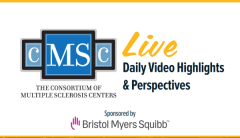
Commentary|Videos|May 31, 2024
CMSC Live: 2024 Annual Meeting Day 3
Host Jeffrey Wilken, PhD, chats with Marijean Buhse, PhD, RN, NP-C, MSCN; Amy Sullivan, PsyD, ABPP; and John DeLuca, PhD, ABPP, FACRM, FAPA, FAPS, FNAN, about the third day of the 2024 CMSC Annual Meeting in Nashville, Tennessee.
Advertisement
Host
- Jeffrey Wilken, PhD
President-Elect, Consortium of Multiple Sclerosis Centers (CMSC); assistant professor of neurology, Georgetown University; director of Research, Neuropsychology Associates of Fairfax; executive director, Washington Neuropsychology Research Group
Guests
- Marijean Buhse, PhD, RN, NP-C, MSCN
Clinical Professor of Graduate Studies/Advanced Practice Nursing; Program Director, Doctor of Nursing Practice, Stony Brook School of Nursing - Amy Sullivan, PsyD, ABPP
Associate Professor of Medicine, Cleveland Clinic Lerner College of Medicine; Director, Neurological Institute Engagement and Well-being; Director of Behavioral Medicine & Research, Mellen Center for MS; Chair, Neurological Institute Engagement and Women’s Leadership Development Cleveland Clinic - John DeLuca, PhD, ABPP, FACRM, FAPA, FAPS, FNAN
Senior Vice President for Research and Training at Kessler Foundation; Professor in the Department of Physical Medicine & Rehabilitation and the Department of Neurology, Rutgers New Jersey Medical School
Segment Breakdown
- 00:00 – Marijean Buhse, PhD, RN, NP-C, MSCN, discusses her panel presentation on multidisciplinary NMOSD care, the need for better definition of patient-reported outcomes in MS, and her presentation on MS aging and the conversation about stopping disease-modifying therapy.
- 09:51 – Amy Sullivan, PsyD, ABPP, talks about the ability to reconnect with colleagues at CMSC, Francios Bethoux's talk on art as a therapeutci medicine in MS, her presentation on stress management tools in MS, empowering women in leadership roles in medicine, and the need to better address burnout among physicians.
- 00:00 – John DeLuca, PhD, ABPP, FACRM, FAPA, FAPS, FNAN, speaks about being inducted into the 2024 class of Giants of MS, his symposium of addressing and defining fatigue in clinical care, the failure of pharmacotherapy for cognitive challenges in MS, and the lack of clinical application of cognitive rehabiliation tools despite the thorough and exisiting literature supporting its use.
Newsletter
Keep your finger on the pulse of neurology—subscribe to NeurologyLive for expert interviews, new data, and breakthrough treatment updates.
Advertisement
Latest CME
Advertisement
Advertisement
Trending on NeurologyLive - Clinical Neurology News and Neurology Expert Insights
1
Cladribine Tablets Show Ability to Improve or Stabilize Cognitive Function in Patients With Relapsing Multiple Sclerosis
2
Women Physicians Day 2026: Sex-Specific Clinical Considerations in Women With Epilepsy
3
Myelin Protective Small Molecule Lucid-MS Shows Promising Early-Stage Data in Healthy Volunteers
4
Cladribine Tablets Reduce Treatment Switches, Outpatient Visits, and Health Care Costs in Multiple Sclerosis
5











